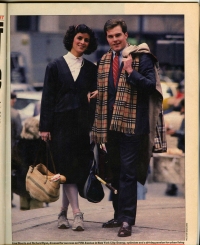Following the death of Ronald Reagan in June 2004, a wealth of articles were spawned with the aim of evaluating not only his presidency, but also his historical legacy. One such article by Mark Weisbrot (found at
http://www.commondreams.org/views04/0607-09.htm) adopts the view that Reagan would (or should) be regarded as someone 'who changed the world more than probably any American in the twentieth century,' going on to introduce key issues which helped define his two terms in office.
When Reagan was inaugurated in January 1981, he was just over two weeks away from his seventieth birthday, with Weisbrot thus affectionately dubbing his demeanor throughout his presidency as 'grandfatherly.' The article points out that even those who disagreed with his policies were inclined to re-elect him in 1984, raising questions over the importance of communication and resonance with the electorate. Indeed, Reagan was known as 'The Great Communicator.' His leadership skills were almost universally admired. There does seem to be a distinct air of superiority which accompanies Reagan. Even taking a brief look at his more positive representations, one cannot ignore a sense of "godliness" - someone overseeing the nation and acting as something of a protector.
Regarding Reagan 'changing the world,' the article continues and begins to take a distinctly more negative approach to the evaluation of his legacy. Two main prongs of his presidency appear time and time again - the domestic economy and foreign policy:
Where economics are concerned, policies initiated by Reagan were, in Weisbrot's opinion, 'mostly a failure.' Such policies which dominated 198os America, known as "Reaganomics" had the collective aims of reducing government spending, reducing income tax and reducing government regulation of the economy as a whole. He his opinion, 'only by reducing the growth of government [could they] increase the growth of the economy.' On the surface, this seems somewhat of a paradox - balancing the budget by cutting taxes, as well as notably increasing the military budget, seems a mathematical impossibility. The article makes a point of stating that, under Reagan, the 1980s saw the slowest growth rate of any post-World War II decade. As we have also seen in recent years, the President does admittedly bear the brunt of criticism when the economy takes a turn for the worse. That said, the unemployment rate declined from 7% in 1980 to 5.4% in 1988 with the rate of inlfation dropping from 10.4% in 1980 to just 4.2% in 1988. Broadly speaking, therefore, the nation under Reagan saw some notable economic improvements. As William A. Niskanen notes, 'the "stagflation" and "malaise" that plagued the U.S. economy from 1973 through 1980 were transformed by the Reagan economic program into a sustained period of higher growth and lower inflation' (
http://www.econlib.org/library/Enc1/Reaganomics.html).
Regarding foreign policy, it seems fair to focus on the Iran-Contra Affair which came to light in late 1986. In what was seen as an eventual "weapons-for-hostages" deal, officials under Reagan secretly facilitated the sale of arms to Iran, with the aim of releasing 6 U.S hostages who were being held by Iranians in Lebanon. The selling of weapons to Iran by Reagan's government to Iran (a country with the US had no diplomatic relations) provided finances to fund the Contras (a rebel group fighting a civil war in Nicaragua) - America had entered a proxy war and aimed to release the US hostages. Negotiations occured without Congress' knowledge - negotiating with a Iran, as a terrorist state, was seen as unconstitutional, as was supporting a rebel group (the Contas) who were known for violating Human Rights laws.
It is clear to see why the Reagan polarised opinion. As times as gone on, after he left office, his approval ratings have steadily increased. In 1999, for instance, C-Span conducted a presidential leadership survey which saw Reagan rated sixth best.
 log http://www.80sactual.com/2009/10/yuppie.html starts off by mentioning a book called Diary Of A Yuppie by Louis Auchincloss. The story of Robert Service's quick rise to the top in the world of New York law and his love of posh clothes, posh food, boardroom meetings and making money.
log http://www.80sactual.com/2009/10/yuppie.html starts off by mentioning a book called Diary Of A Yuppie by Louis Auchincloss. The story of Robert Service's quick rise to the top in the world of New York law and his love of posh clothes, posh food, boardroom meetings and making money.










